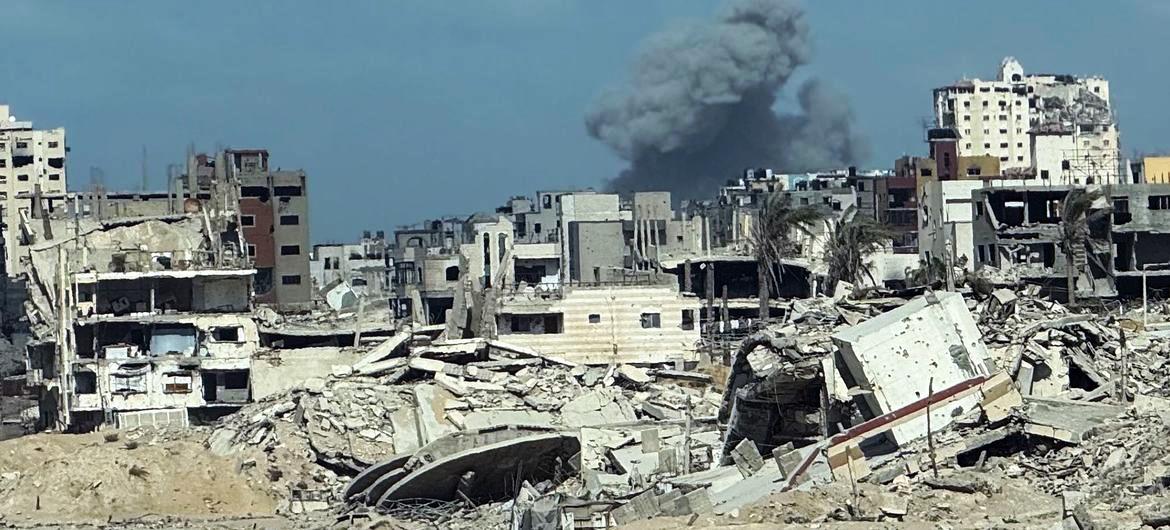A protestor in Nairobi streets leaps over fire. PHOTO/UGC
By EW TEAM
The smoke rose before the sun. Across Nairobi, the streets told a story older than the year it marked. Burnt tyres, mangled barricades of stone and metal, young voices raised in fury, and a nation once again brought to its knees by its youngest citizens.
It has been exactly one year since the 2024 Finance Bill protests erupted like wildfire across Kenya, led by a restless generation that had until then seemed politically disengaged; the so-called Gen Z. Today, the flames of their discontent were rekindled, not as a commemoration but as a confrontation: raw, emotional, unrelenting.
From Nairobi’s tense city centre to the steamy coastal avenues of Mombasa, the agricultural highlands of Nyeri to the vibrant towns of Western Kenya, thousands of young protesters flooded the streets with a message that was both old and urgent: “Ruto must go.”
In Nairobi’s Central Business District, the city didn’t wake to matatus and businessmen. Instead, the silence of dawn was shattered by chants — and the smell of burning rubber. Protesters blocked major arteries like Thika Superhighway, Jogoo Road, and Kenyatta Avenue, turning roads into rivers of resistance.
Some carried placards bearing the faces of those killed a year earlier. Others laid wreaths outside Parliament, marking the very steps where dozens had fallen in the chaos of June 25, 2024. Their slogans were familiar, but the grief behind them was heavier.
“This isn’t just a protest,” said 22-year-old Mariam Wanjiku, her voice breaking. “This is mourning. For Ojwang. For Boniface. For every life taken, every future stolen.”
She held up a placard with a drawing of Albert Ojwang — the teacher and blogger allegedly beaten to death by police just weeks ago. “His death reminded us that nothing has changed,” she said.
One year ago, the 2024/25 Finance Bill ignited one of the most significant youth-led uprisings in Kenya’s history. The Bill, which proposed harsh taxes on fuel, food, and digital goods, became a symbol of state overreach in a country already choking under economic hardship.
What began as peaceful demonstrations quickly turned into chaos when protesters stormed Parliament. The government’s response was swift and violent: tear gas, rubber bullets, and live fire. By nightfall, at least 60 people were dead, dozens injured, and hundreds arrested.
President William Ruto rescinded the Bill days later and reshuffled parts of his Cabinet, but for many, it was too little too late. The trust had already ruptured. The cost had already been paid in blood. And today, those wounds were laid bare again. At the heart of today’s protests was memory. And the grief that comes with it.
Along Moi Avenue in Mombasa, thousands of young Kenyans gathered around the city’s iconic Elephant Tusks at 10am. Many wore black. Some carried flowers. Others sang songs of sorrow. They marched to Sabasaba Junction and Mwembe Tayari Road, where violent clashes soon broke out with riot police. Tear gas hung thick in the air. Still, they kept marching.
“I was there last year. My best friend never came back,” said 20-year-old Musa Said, weeping. “I came back for him. For his mother. For his dreams.”

Embakasi East MP Babu Owino joined protests in Nairobi streets. PHOTO/UGC.
In Nyeri, the symbolic weight of the protest was especially heavy. It is the hometown of impeached former Deputy President Rigathi Gachagua, a figure still divisive in the political imagination. Protesters there gathered outside county offices, building makeshift barricades and demanding accountability from leaders who they claim had long turned a blind eye.
In every town; Nakuru, Kisii, Kakamega, Eldoret, Embu, Meru, Nanyuki, the rhythm was the same: chants, barricades, defiance. In Kisii, burning tyres glowed orange against grey skies as groups of young people faced off against police with nothing but stones and slogans.
Kakamega witnessed some of the most violent clashes of the day, with protesters accusing “goons” aligned with the ruling coalition of infiltrating and provoking violence. Tear gas mixed with smoke from bonfires, as ambulances rushed the injured to hospital.
In Nairobi, a chilling tension gripped the capital. Police and, in some areas, the Kenya Defence Forces, had fortified key government sites with razor wire and barricades. Yet protesters still found a way through.
Independent observers reported that at least two people had been shot in the days leading up to the anniversary. Though no official fatalities were confirmed today, several injuries were reported across protest zones.
Perhaps most provocatively, some counter-protesters appeared in downtown carrying clubs and engaged in brief but heated scuffles with Gen Z protesters. Police denied any connection.
“We are still here,” said protester Zedrick Oloo, a university student from Kisumu, hoarse from chanting. “They thought we’d get tired. They thought the deaths would scare us. But this is our country too.”
The slogans ; “One term,” “Ruto must go,” “No more exploitation” , weren’t just chants. They were declarations of identity. Of ownership. Of a generation that has refused to be seen as voiceless or apathetic.
In Nakuru, crowds surrounded the heavily guarded State House, chanting until dusk. In Nyeri, protesters scrawled names of victims on county office walls. In Mombasa, a sea of youth filled the streets chanting, *“We want a future!”
In every location, the fight was about more than tax. It was about dignity. Inspector General of Police Douglas Kanja had earlier warned against unauthorised protests in “protected areas.” Yet the mobilisation unfolded across almost every urban centre.
Government officials insisted the day was “a normal working day.” But the reality on the ground told a different story. Most businesses remained shut. Public transport was paralysed. City streets looked like war zones , yet no curfew had been declared.
Western governments including the US, UK, and Canada; issued rare joint statements urging restraint, condemning the use of force, and expressing concern over reports of infiltration by plain-clothes agents.

The protestors remained defiant. PHOTO/UGC
Meanwhile, Kenya’s Catholic bishops warned against the “bloodlust of an unaccountable police force,” calling for the government to honour constitutional protections for protest and free expression.
Analyst Mikhail Nyamweya describes today’s protest as “a boiling point revisited.” “What’s most troubling,” he says, “is that the grievances that led to the 2024 revolt haven’t been meaningfully addressed. We’ve seen symbolic reforms — reshuffles, commissions — but the police still act with impunity. The economy is still suffocating the youth. Corruption is still rampant.”
He adds that Ojwang’s death and the shooting of vendor Boniface Kariuki were not isolated incidents but part of a broader pattern of state violence and neglect. “These deaths reopened wounds that had barely begun to scab.”
Six people including three police officers, have been charged with murder in connection to Ojwang’s death. But faith in justice remains low. If the government hoped the first anniversary would pass as a quiet reflection, it was mistaken. Today was no memorial. It was a warning.
Every burning tyre, every chant, every stone thrown carried the same message: The anger is still alive. As dusk settled over Nairobi, with streets strewn with debris and the smell of smoke lingering in the air, a group of teenagers marched down University Way, waving tattered Kenyan flags painted with red handprints.
They sang a song of protest, one born from the digital era but soaked in old grievances, inequality, repression, betrayal.
“This is our country,” shouted one. “And we’re not leaving the streets until they listen.”
As President Ruto faces increasing pressure both locally and internationally, the question remains: how long can a government hold against a generation that has nothing left to lose and everything to fight for?
The Gen Z uprising was never just about a Bill. It was about being seen. Heard. Valued. And today, they made sure the nation heard them once more. Loud. Defiant. Unapologetic!


















